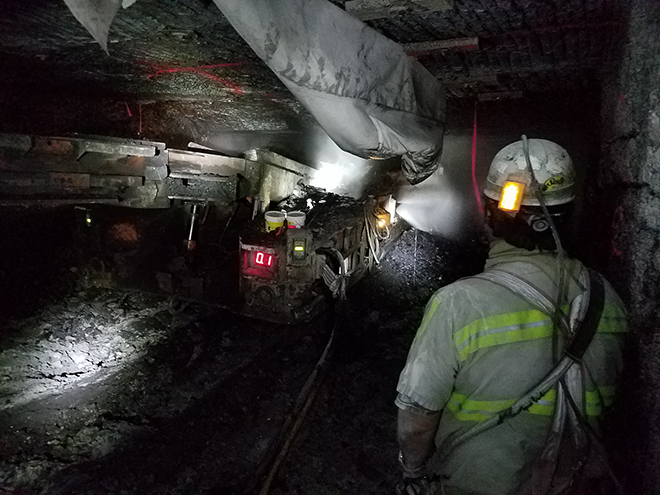S&P Global Offerings
Featured Topics
Featured Products
Events
S&P Global Offerings
Featured Topics
Featured Products
Events
S&P Global Offerings
Featured Topics
Featured Products
Events
Banking & Capital Markets
Economy & Finance
Energy Transition & Sustainability
Technology & Innovation
Podcasts & Newsletters
Banking & Capital Markets
Economy & Finance
Energy Transition & Sustainability
Technology & Innovation
Podcasts & Newsletters
S&P Global Offerings
Featured Topics
Featured Products
Events
15 Jan, 2021

|
An underground coal miner operates a continuous mining machine at an Illinois Basin coal mine. |
In the early days of the new Biden administration, U.S. mine workers may get the additional COVID-19 protections they have sought since March 2020.
After calling on federal officials at the U.S. Mine Safety and Health Administration to issue an emergency temporary standard for workers in the early days of the pandemic, the United Mine Workers of American International Union, or UMWA, later joined with United Steel, Paper and Forestry, Rubber, Manufacturing, Energy, Allied Industrial and Service Workers International Union to sue the agency. While the U.S. Court of Appeals for the District of Columbia Circuit sided with MSHA, which said a rule was not necessary, there are indications that the agency will take a different approach under a Biden presidency.
Biden's transition team did not return a request for comment on whether the new administration would move forward on the additional protections for miners. However, the president-elect previously called on the Trump administration to "immediately release and enforce an emergency temporary standard" to give employers across industries specific, enforceable guidance on stopping the virus's spread.
William Doran, an attorney focused on safety and health issues with Ogletree Deakins, Nash, Smoak and Stewart PC, said he expects an emergency temporary standard for COVID-19 protections to happen "very quickly" and is probably already "drafted and ready to go." He added that he believes there will be a formal rulemaking process to put similar protections in place permanently.
Doran said the standard would likely include things many producers are already doing, including social distancing, mask requirements, employee screenings and similar precautions. However, based on a review of what some states have already done, it may also require additional procedures some operators are not doing, including a requirement to conduct detailed workplace exposure assessments.
"We'll have to see exactly what the standard says," Doran told S&P Global Market Intelligence. "There's no question that early on, there'll be some catch-up for some people."
UMWA spokesman Phil Smith said the union plans to renew its efforts to secure an emergency temporary standard under Biden's leadership. Smith said the UMWA has already had conversations with the transition team at the U.S. Labor Department.
Smith said at least 250 miners tested positive for the coronavirus in mines the UMWA represents.
"Fortunately, none of our members have died from it as of now, but dozens have been hospitalized, as have members of their families," Smith told S&P Global Market Intelligence. "Whole shifts have been off work and quarantined for 14 days."
The union has pointed to specific risks to miners because many of them work in confined spaces. They also highlighted concerns about possible complications that COVID-19 could introduce to other respiratory ailments common among coal workers, such as black lung disease.
The UMWA has engaged employers where it represents workers to increase safety standards, but part of the organization's concern is that workers at other operations may not get the same protections. The majority of coal produced in the United States comes from nonunion mines, based on U.S. Energy Information Administration data.
Assistant Secretary of Labor for Mine Safety and Health David Zatezalo, a former coal company executive appointed by the Trump administration, has argued that the standard was unnecessary.
"While we appreciate the seriousness of COVID-19 in the U.S. population generally, no data available at this time suggests higher incidence rates among miners specifically, despite the fact that so many mines have continued to operate," Zatezalo wrote in a June 2020 letter to the union included in legal filings. "Existing mandatory standards regarding, for example, sanitation and respiration in mines, actually render MSHA more equipped, not less, to address the threat of COVID-19."
In a recent audit report, the Office of Inspector General for the Labor Department recommended that MSHA monitor information about the virus and reevaluate its decision not to issue the emergency standard.
"MSHA has issued an information sheet as guidance, adjusted operations, and implemented safety measures to try to address these challenges to the maximum extent MSHA feels practical," the report concludes. "However, more action is needed to address any potential backlog created by the pandemic and the need for an emergency temporary standard."
In a July 2020 response to the report, Zatezalo reiterated that MSHA determined "no grave danger exists at mines" that warrants taking the steps toward an emergency temporary standard.

